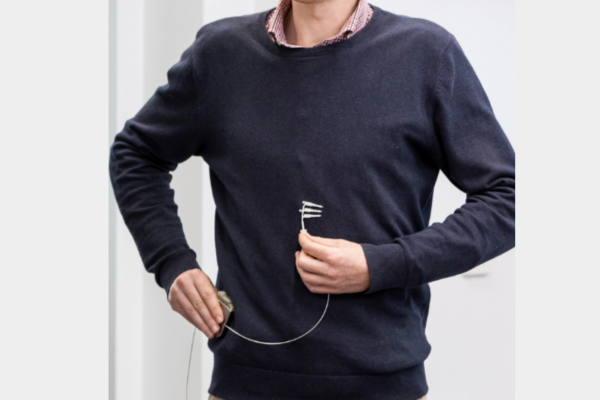About
Crohn’s breakthrough surgery offers hope for ‘drug-free’ life
- Home
- About
- Latest news
- Crohn’s breakthrough surgery offers hope for ‘drug-free’ life

A Melbourne dad with a debilitating chronic disease is the first patient in the world to test a new bionic device, after undergoing a historic surgery at The Austin Hospital.
Scientists hope the “set and forget” nerve device, placed after surgery to remove damaged bowel, can stop Crohn’s disease from returning “drug-free”.
It was invented in Victoria by the Bionics Institute, the Florey Institute and Melbourne University, after they won US defence funding for inflammatory bowel disease research.
Anthony Becker, 45, received the device — which uses electricity to target a key nerve linked to breathing, heart rate and digestion — last month and is doing well.
Austin Health inflammatory bowel disease service director Peter De Cruz said, if successful, the device would “revolutionise” treatment and offer an alternative to lifelong drugs with side effects.
“They can then carry on with their lives without the worry of medications,” Associate Professor Cruz said.
He said it aimed to trigger the body’s “natural anti-inflammatory process” to stop Crohn’s damaging the lining of the gut.
He told the Herald Sun the disease returns within a year of surgery — required for most patients — nine out of ten times, with some needing further operations.
Bionics Institute chief technology officer James Fallon said their “flip-phone” sized device sits in the patients’ lower body and has a lead with six “little” strips of electrodes.
“It just kind of snuggles around the vagus nerve and clips on a bit like a zip tie,” Professor Fallon said.
He said other researchers had targeted the nerve via the neck, where it had “remarkably good” results when successful but risked “off-target effects”.
“If you stimulate it the wrong way, you will have dramatic effects on breathing and heart rate,” he said.
He said they used knowledge gained from the cochlear implants’ invention to hit the nerve near the stomach below the “heart and lung branches”.
“The participant uses a remote control to turn the device on, three hours later they turn it off,” he said.
Prof Cruz said they targeted the vagus nerve to trigger the “anti-inflammatory processes” because they believe Crohn’s occurs “due to an exaggerated immune response to the gut bugs”.
“The nervous system plays an important role in regulating the immune response triggered by any imbalance between the good and bad bacteria in the gut,” he said.
He said Australia had one of the highest rates of Crohn’s but — if successful — their research could also help other conditions, like rheumatoid arthritis, diabetes and obesity.
Mr Becker told the Herald Sun the significance of the world-first surgery did not hit him until afterwards.
He said a medication-free future sounded amazing and he wanted to help those who cannot work and fear “leaving the house”.
“Some people can’t get out of bed and are in constant pain and are having to go to the toilet 20, 30 times a day,” he said.
Recruitment is underway for more patients and samples collected will also be analysed to try and learn more about Crohn’s exact cause.


